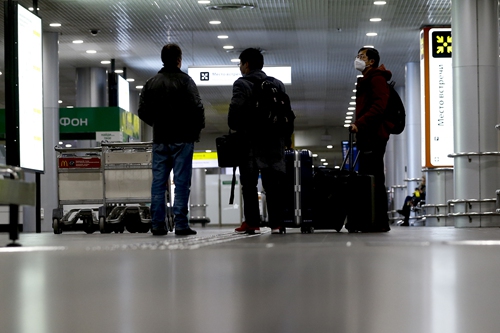HOME >> CHINA
China fights virus on ‘two fronts’: observers
By Liu Caiyu, Huang Lanlan and Cao Siqi Source:Global Times Published: 2020/3/4 0:08:40

Passengers are seen after COVID-19 examinations at Sheremetyevo International Airport in Moscow, Russia on February 26. Photo: AFP
More confirmed cases of COVID-19 have been spotted on people who returned from other countries facing a serious epidemic, adding new challenges to the virus prevention and control work in the next stage, which also means China needs to fight the novel coronavirus "on two fronts," — stabilizing domestic situation and curbing the import of the virus from overseas, experts noted.
In the latest case, seven more overseas Chinese returning from Italy to Qingtian county in East China's Zhejiang Province have been confirmed to contract the novel coronavirus, local authorities announced Tuesday. Six of them transferred via Moscow and arrived at Shanghai Pudong International Airport on Thursday and then took a charter vehicle to enter Qingtian. The province had reported one confirmed imported case from Italy on Monday.
Qingtian county is a well-known hometown of overseas Chinese, and to rule out the possibility of them becoming the source of infection, the local government told the Global Times that it has put over 200 people under medical quarantine, many of whom are returnees.
Three teams from the county were dispatched at airports in Shanghai, Hangzhou and Wenzhou to pick up those who choose to return. Once they reach Qingtian, they would be assigned to designated places for further observation and quarantine, a publicity department official in Qingtian surnamed Zhou told the Global Times.
Zhou told the Global Times that the Qingtian government doesn't encourage those overseas to return at this critical time. But once they're back, the government would offer support, Zhou said.
A passenger who preferred to be called Xiaomin and shared the same flight with the confirmed cases in Qingtian from Moscow to Shanghai, told the Global Times that she felt scared when being told she just sat near a confirmed case on the flight by local health authorities.
Once patients know they had symptoms of infections, they shouldn't have taken public transportation. Such an irresponsible and selfish behavior posed danger to themselves but also people who had close contact with them, Xiaomin said.
She and her family members are currently under medical observation in Taizhou, East China's Jiangsu Province.
Following the report of the seven new imported cases, Shanghai municipal government traced 71 people who had close contacts with them and put them in quarantine.
Some Chinese in Italy reached by the Global Times said they were considering flying back to China as the country's strong measures to control the coronavirus outbreak are proving effective and they share common concerns over the lack of public awareness on the outbreak overseas.
As the epidemic gets more serious in Italy, the Chinese embassy and consulates there are paying high attention to the health and safety of Chinese nationals in this country, the Chinese Embassy in Italy said in a statement sent to the Global Times on Tuesday.
The prevention and control work in China proceeds well and preventing imported cases is the focus for some local authorities and regions, the embassy said.
China cannot shut out Chinese nationals abroad and foreigners who have permanent residency in China as the country is responsible for them. But at this critical time, they should not be encouraged to travel, Yang Jingmin, a research fellow at Institute of Urban Governance of Shenzhen University, told the Global Times.
To further prevent overseas cases from reviving domestic infection, all entry points in China should conduct risk evaluation to planes, trains, vehicles and ships that dock, Yang suggested.
To curb the backflow of infection from overseas, Beijing, the capital, required all travelers, both Chinese nationals and foreigners, entering Beijing from the virus hotspots of South Korea, Japan, Iran and Italy to be quarantined for 14 days at their residence or at specified hotels.
"At present, with the worsening situation in other countries, more Chinese nationals overseas want to come back to China. Beijing is now facing heavy pressure to prevent virus imports," Chen Bei, deputy general secretary of Beijing municipal government, said at a press conference on Tuesday.
A source close to the Wenzhou government told the Global Times that people who return to the city from major epidemic areas overseas are required to be quarantined for 14 days.
"Foreigners in the city are also requested to be quarantined at home or collectively. Their employers are responsible for that," the source said, noting that the local government was alert to imported cases at the end of February and has been implementing detailed schemes.
So far, the total of imported cases reported in China reached 13. Apart from the 8 cases from Italy reported in Zhejiang, they also include two cases from Iran reported in Northwest China's Ningxia Hui Autonomous Region, another two from Iran in Beijing, as well as one from the UK detected in Shenzhen, South China's Guangdong Province.